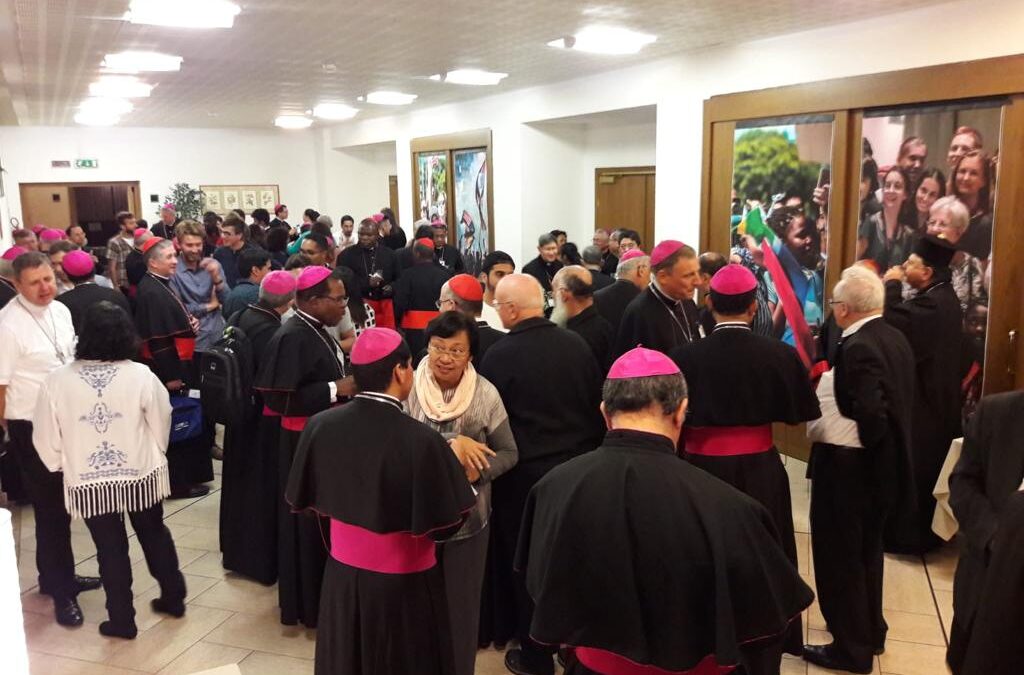
Oct 17, 2018 | Non categorizzato
Conversations in different languages could be heard amid the tastefully and simply set tables. For three evenings, the young people of the Focolare acted as hosts in a hall, close to where the works of the Synod will carry on up to 28 October. After a warm welcome, the three dinners revealed to be the right occasions for the exchange of ideas, informal sharing and mutual interaction. During dessert, there was a presentation of the recent international Genfest held in Manila and some experiences, and stories of commitment and coherence to boost closer contact with the synodal Fathers, in line with a meeting held a day earlier, where they express queries, uncertainties, choices, in the hope that the Synod would propose some answers. In the second soiree, František from Czechia took the floor. His words highlighted a genuine passion for politics and concrete commitment in view of the next European Parliament elections emerged with the request, “Please support me with your prayers, so that I may always be faithful to the choice of serving my people, without any personal interest.” A similar story came from Nicola. She is 33 and a pediatric therapist in a university hospital. “I engage in rare pathologies and pediatric insurgence, and therefore I am always in contact with situations often at the brink of death. The difficulty at times lies in communicating to the relatives, the prognosis and life expectancies of the child. In these moments, I entrust myself to God, so that he may help me find the right words and attitude. Cynical detachment is a due form of survival, but we mustn’t lose the human dimension. Every day for me is like a gym in which to love and serve God.” Then it was Nicola’s turn. “Practicing this profession – he explained – means living at the limit between faith and reason; in these years I have learned what suffering is, and what it means to live immobile on a bed, attached to the mechanical lung for breathing. At times my faith is harshly put to the test, but then I have no time to reflect, being ’forced’ to see to the people I have before me, and loving them. This is really a countenance of Jesus Forsaken. If I manage to welcome him poor and miserable as he is, this fills up the void. I have to face many situations. 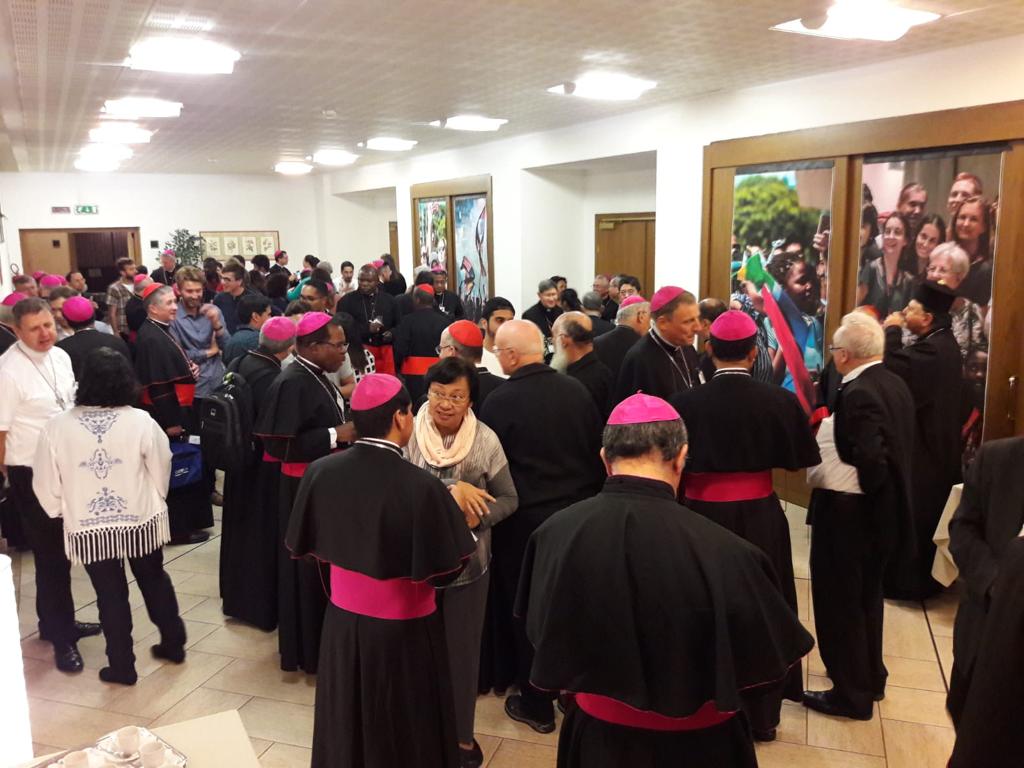 The families of the eastern countries are at times the most desperate since they do not have adequate healthcare systems, both from the economic and clinical standpoints that can help them. This is why they undertake hope journeys to our hospitals in search of treatments, which in some cases imply great expenses, given that these are issued only to Italian citizens. These situations lead us to reflect that at times, being born in one part of the world is just a matter of luck. It is in these cases that God reveals his grandeur and asks you to do the impossible. We certainly must not break the laws but we can try to help in other ways, for example, proposing strategies to limit at best the deformity of the joints, or trying to stand by and be of help.” Time had flown. It seemed like the guests did not wish to leave. The challenge of a deep and reciprocal listening between generations, the reason for the Synod itself, had also taken the form and consistency even in a dinner. And the dinner ended with the words of the song dedicated to Mary, the silent response of utmost love. By Chiara Favotti and Gustavo Clariá
The families of the eastern countries are at times the most desperate since they do not have adequate healthcare systems, both from the economic and clinical standpoints that can help them. This is why they undertake hope journeys to our hospitals in search of treatments, which in some cases imply great expenses, given that these are issued only to Italian citizens. These situations lead us to reflect that at times, being born in one part of the world is just a matter of luck. It is in these cases that God reveals his grandeur and asks you to do the impossible. We certainly must not break the laws but we can try to help in other ways, for example, proposing strategies to limit at best the deformity of the joints, or trying to stand by and be of help.” Time had flown. It seemed like the guests did not wish to leave. The challenge of a deep and reciprocal listening between generations, the reason for the Synod itself, had also taken the form and consistency even in a dinner. And the dinner ended with the words of the song dedicated to Mary, the silent response of utmost love. By Chiara Favotti and Gustavo Clariá
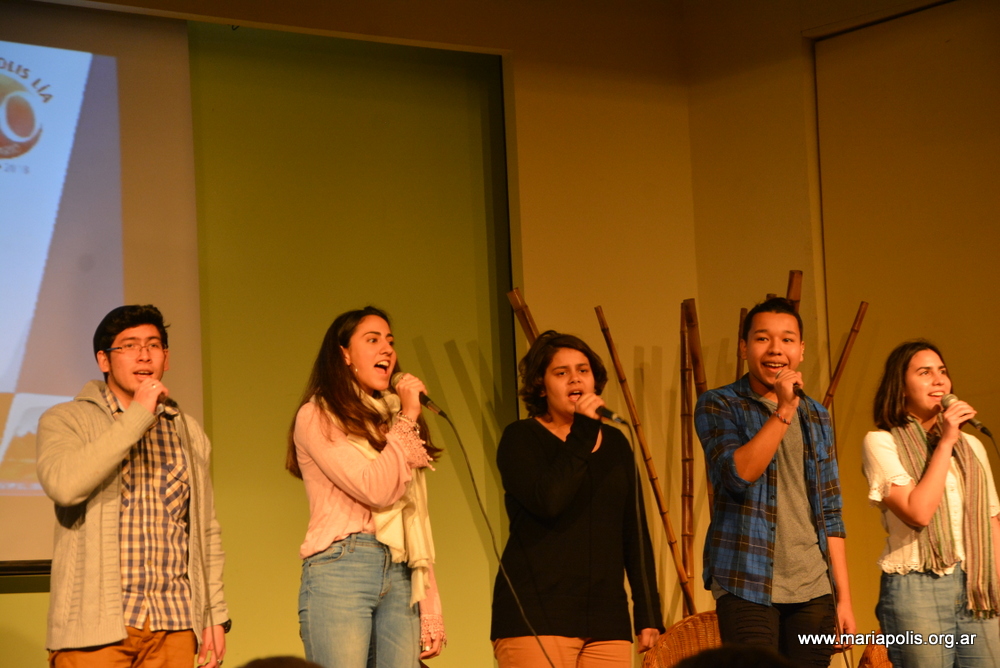
Oct 15, 2018 | Non categorizzato
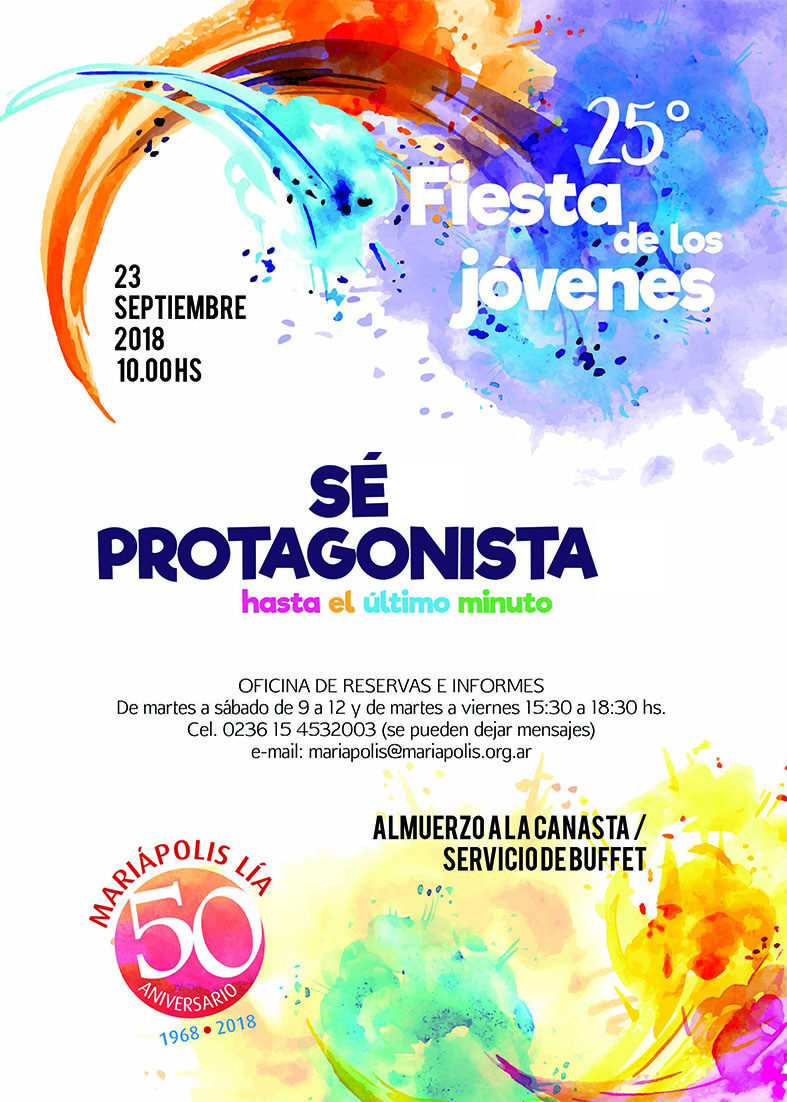 Argentina, Mariapolis Lia. 800 young people learning how to take lead roles, not only in drama but in real life. In the Argentine Pampas, the Focolare town Mariapolis Lia – named after Lia Brunet, a pioneer of the Focolare Movement in South America – is not slowing down after celebrating the 50th anniversary of its foundation in July. It launched an invitation over a spring weekend in September for young people to take the lead in their own lives “right to the last moment”. «This expression – explained a Mariapolis Lia resident – is inspired by Guillermo Curti, a Focolarino priest who died suddenly early in the year and who was for us a model of faithfulness and of love right to his last moment». The weekend of 22nd-23rd September saw the arrival of 800 young people from Paraguay, Uruguay and Argentina. «On the first day, we worked together in groups according to our countries of origin in order to prepare stands across the whole little town which showcased our own cultures and helped us all to get to know each other on a personal level. In the evening we put on a wonderful show of dance and performances reflecting our different folkloristic traditions. All of us young people found ourselves taking the lead in the preparation of the second day, Sunday, when more young people arrived from different regions of Argentina».
Argentina, Mariapolis Lia. 800 young people learning how to take lead roles, not only in drama but in real life. In the Argentine Pampas, the Focolare town Mariapolis Lia – named after Lia Brunet, a pioneer of the Focolare Movement in South America – is not slowing down after celebrating the 50th anniversary of its foundation in July. It launched an invitation over a spring weekend in September for young people to take the lead in their own lives “right to the last moment”. «This expression – explained a Mariapolis Lia resident – is inspired by Guillermo Curti, a Focolarino priest who died suddenly early in the year and who was for us a model of faithfulness and of love right to his last moment». The weekend of 22nd-23rd September saw the arrival of 800 young people from Paraguay, Uruguay and Argentina. «On the first day, we worked together in groups according to our countries of origin in order to prepare stands across the whole little town which showcased our own cultures and helped us all to get to know each other on a personal level. In the evening we put on a wonderful show of dance and performances reflecting our different folkloristic traditions. All of us young people found ourselves taking the lead in the preparation of the second day, Sunday, when more young people arrived from different regions of Argentina».  For Sunday’s programme, the Mariapolis was transformed into a cinema set, ready to start filming various movies set in five different eras (the 70s, 80s, 90s, 2000s and 2010s), in a range of genres, ranging from horror to musical, drama to science fiction. «The five decades represented the fiftieth anniversary of the Mariapolis town – they explained. Each film explored, through experiences and life stories, at least one of the challenges faced by young people today: forms of dependency, consumerism, life choices, social and mass media». To conclude, an award ceremony along with speeches in front of a live audience in the Mariapolis town, with another 200 groups following on a live link and thousands more viewing online over the following days. «What emerged as the weekend came to a close was an all pervasive sense of joy. Together we had faced up to many difficulties and shared a deep experience of unity which changed us. We experienced it as the presence of Jesus among us». As hundreds of young people travelled home in many directions, for those who remained in the Mariapolis Lia, the celebration continued with a shared supper and more singing and dancing, to express their joy at such an inspiring experience lived together.
For Sunday’s programme, the Mariapolis was transformed into a cinema set, ready to start filming various movies set in five different eras (the 70s, 80s, 90s, 2000s and 2010s), in a range of genres, ranging from horror to musical, drama to science fiction. «The five decades represented the fiftieth anniversary of the Mariapolis town – they explained. Each film explored, through experiences and life stories, at least one of the challenges faced by young people today: forms of dependency, consumerism, life choices, social and mass media». To conclude, an award ceremony along with speeches in front of a live audience in the Mariapolis town, with another 200 groups following on a live link and thousands more viewing online over the following days. «What emerged as the weekend came to a close was an all pervasive sense of joy. Together we had faced up to many difficulties and shared a deep experience of unity which changed us. We experienced it as the presence of Jesus among us». As hundreds of young people travelled home in many directions, for those who remained in the Mariapolis Lia, the celebration continued with a shared supper and more singing and dancing, to express their joy at such an inspiring experience lived together.
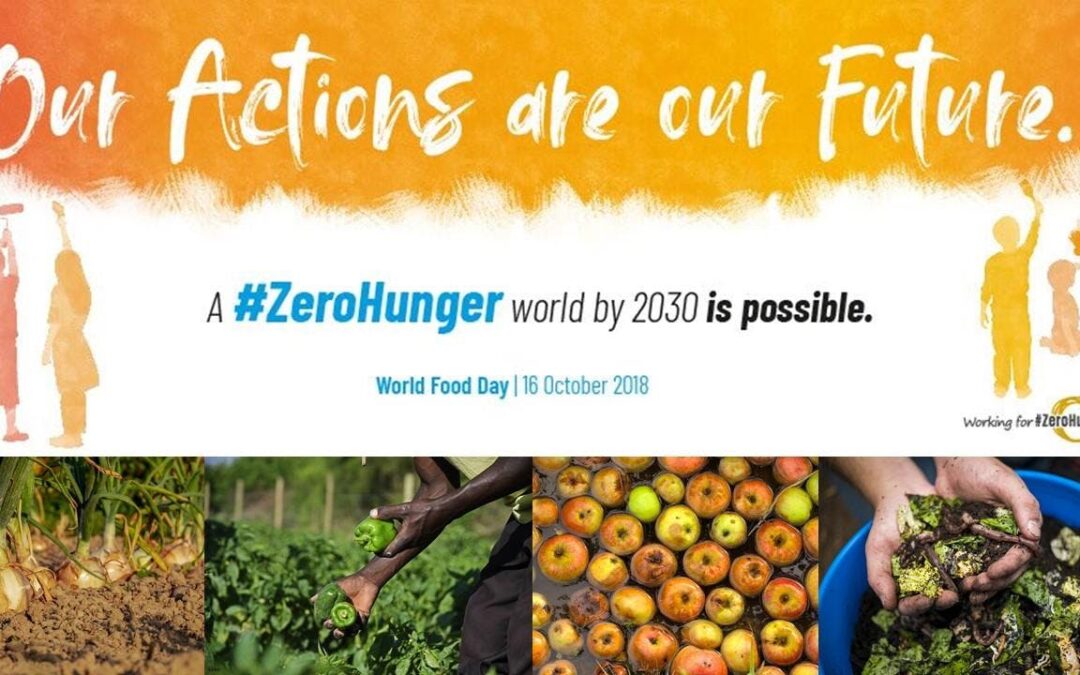
Oct 14, 2018 | Non categorizzato
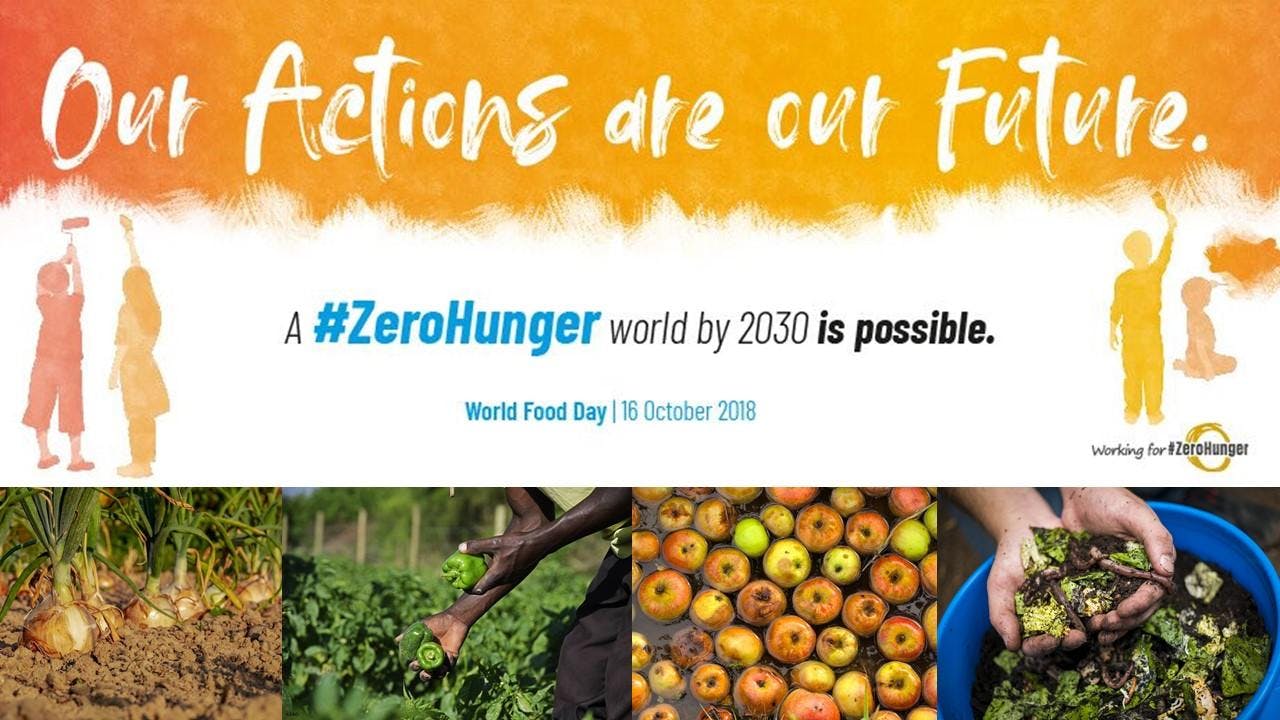 The theme of this year’s World Food Day is “Our actions are our future.” The event is held every year on October 16 by the Food and Agriculture Organisation (FAO). The day involves international organisations along with civil institutes, schools, businesses, media, research organisations and institutions in a rich program of events and public demonstrations to sensitize public opinion on topics such as poverty, hunger and malnutrition in favour of arriving at Zero Hunger, which is included among the objectives for the United Nations 2030 agenda. The teenagers of the Focolare Movement included it as one of the central points of their training and action during the whole year. Last June, a delegation of teenagers took part in a discussion at the International Headquarters of the FAO of Rome, Italy and received a “Zero Hunger Citizen” passport. The held projects around the world to raise awareness among peers and adults and dedicated the 2/2018 edition of the bi-monthly magazine “Teens” (Citta Nuova).
The theme of this year’s World Food Day is “Our actions are our future.” The event is held every year on October 16 by the Food and Agriculture Organisation (FAO). The day involves international organisations along with civil institutes, schools, businesses, media, research organisations and institutions in a rich program of events and public demonstrations to sensitize public opinion on topics such as poverty, hunger and malnutrition in favour of arriving at Zero Hunger, which is included among the objectives for the United Nations 2030 agenda. The teenagers of the Focolare Movement included it as one of the central points of their training and action during the whole year. Last June, a delegation of teenagers took part in a discussion at the International Headquarters of the FAO of Rome, Italy and received a “Zero Hunger Citizen” passport. The held projects around the world to raise awareness among peers and adults and dedicated the 2/2018 edition of the bi-monthly magazine “Teens” (Citta Nuova).
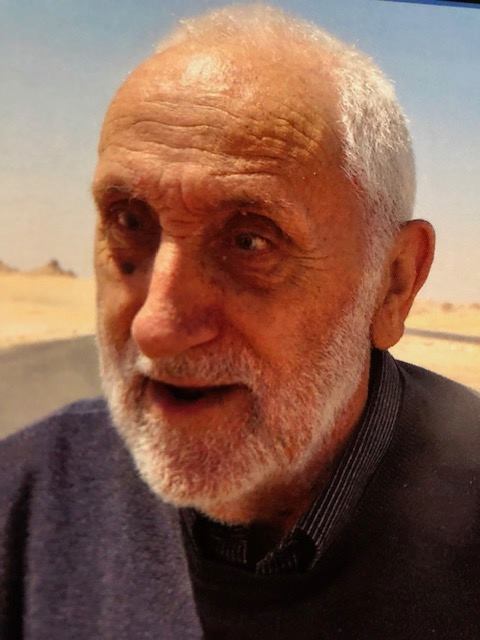
Oct 14, 2018 | Non categorizzato
 On 13 October, Ruggero Badano, father of Chiara Luce passed away at the age of 83. A good man with a simple and strong faith, together with his wife, Maria Teresa, he had witnessed the extraordinary human and spiritual experience which had led their daughter to be declared “Blessed” on 25 September 2010. “I thank Jesus for having sent you in our midst in this Journey which shall never end,” she had written on her 18th birthday. The Focolare Movement conveys its solidarity with Maria Teresa, the members of the Chiara Badano Foundation and all the friends of Blessed Chiara Badano, with immense gratitude for Ruggero’s exemplary life. For info: www.chiarabadano.org
On 13 October, Ruggero Badano, father of Chiara Luce passed away at the age of 83. A good man with a simple and strong faith, together with his wife, Maria Teresa, he had witnessed the extraordinary human and spiritual experience which had led their daughter to be declared “Blessed” on 25 September 2010. “I thank Jesus for having sent you in our midst in this Journey which shall never end,” she had written on her 18th birthday. The Focolare Movement conveys its solidarity with Maria Teresa, the members of the Chiara Badano Foundation and all the friends of Blessed Chiara Badano, with immense gratitude for Ruggero’s exemplary life. For info: www.chiarabadano.org
Oct 12, 2018 | Non categorizzato
Women can symbolize today’s civilization. In magazines and movie screens, in advertising and art, they reign like queens. Yet it is easy to see their royalty as artificial: divas who hold court today are forgotten tomorrow. In contrast, from this perspective the biographies of Christianity’s greatest female saints and their teachings once again become current. Teresa, the reformer of Carmel during the Protestant revolution, under the suspicious gaze of the kings and lords of Spain, faced with the threat of the Inquisition in her country, achieved her freedom through poverty. It is the unique freedom of God’s children. She remade her existence into an eminent adventure to overcome human with divine. She brought beauty, the poetry of holiness, back to the center of our individual and social existence. At the time there was a form of self-righteousness that you might just as well have called misogyny. Catherine of Siena had already suffered it and had been silenced because she was a woman – she who never stopped urging men, including the high and mighty, to not behave like little girls. St. Teresa gave herself entirely to God and inspired other women to do so. The obsession of our modern days lies in a continuous, frenetic demand for recognition and riches. Teresa taught us to free ourselves from this slavery and recover our serenity and peace. In her writings she explains her reasons with evidence, a light that enchants souls – even those of men today who are in the clutches of business. She is a strong woman who speaks only to serve God with energy and perseverance. She knew of the influence that a woman consecrated to God can have on society. Her life and writings demonstrate the essence of the Gospel revolution, in our hearts and in the people, uncovering yet again the essentials of love that, through our neighbors, opens access to God. It puts God in the spirit, in the law, in institutions, in customs. Teresa, with the grace of a mother and teacher, taught to speak continuously with God, a conversation that everyone can carry out within the temple of their souls, even while on the road, even surrounded by noise. I believe that day after day the number of women and men who are guided by Teresa’s wisdom will increase. They will rediscover their reason for being, going back with her to the source. Action will blossom more and more from contemplation. Yet here – we could say with the saint – Martha and Mary almost always align, since the interior works on the exterior … When exterior works come from these roots, there are admirable, sweetly scented flowers that blossom from the tree of divine love. Teresa was a courageous astronaut of the divine, as well as also a practical woman who knew the world. And because she knew the world, she stood out in heaven. If her teachings were to expand even to our own homes, unions, politics, factories and the world, it would become a sort of Carmel, where Teresa took on the feminine royalty of she who was blessed among women. Igino Giordani, Fides, n.7–12, 1962, pp.185–187.
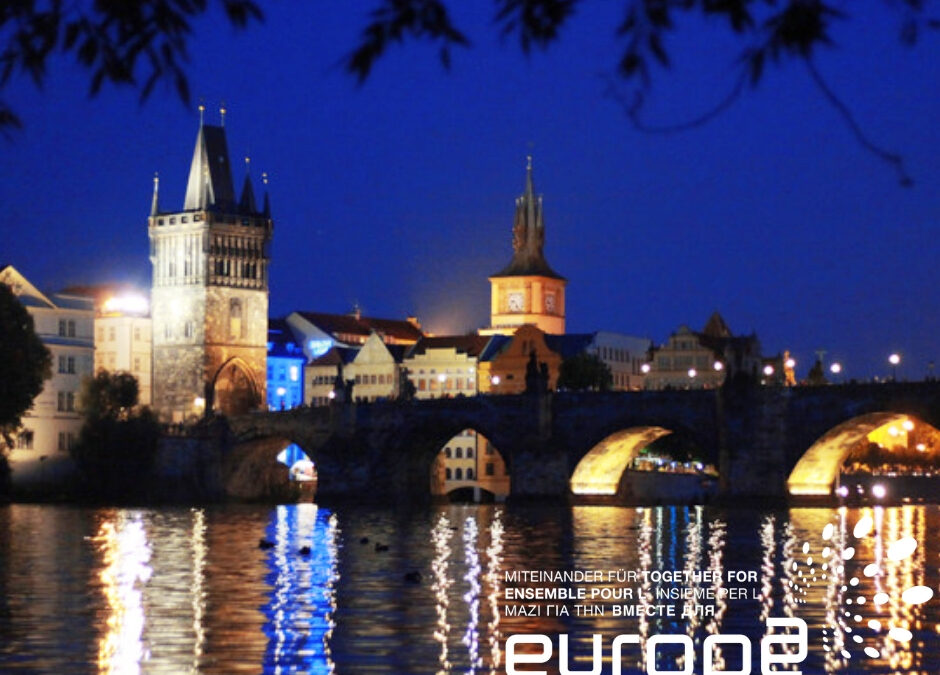
Oct 9, 2018 | Non categorizzato
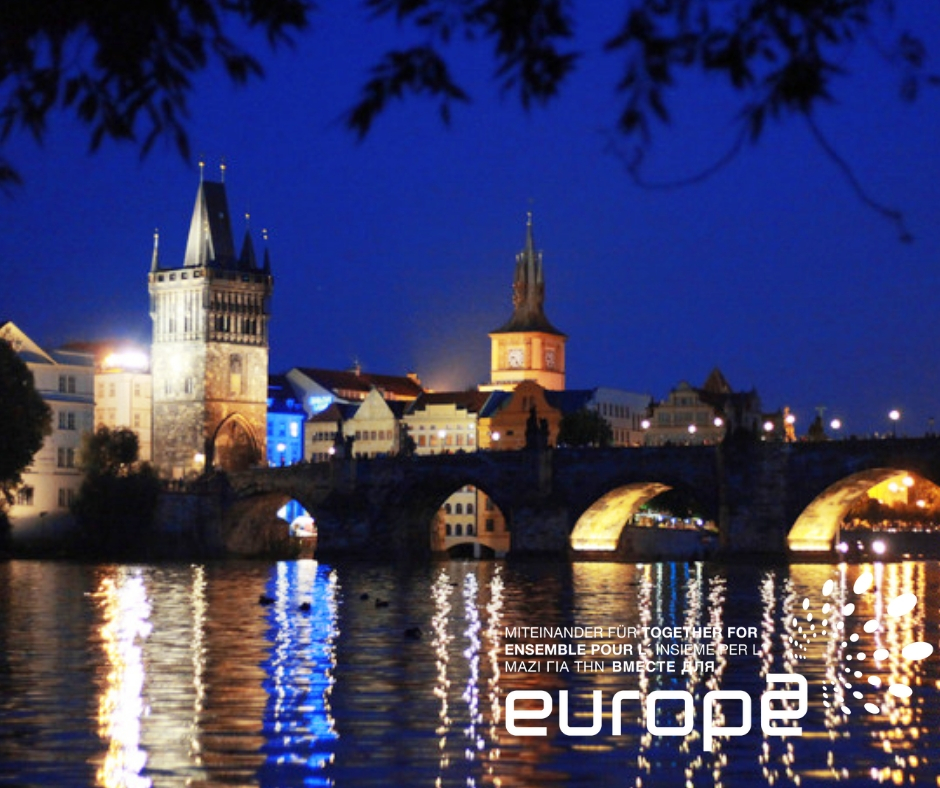 The great history of Central Europe, in particular of the Czech nation will serve as a backdrop for a new stage in the journey of Together for Europe, which promotes dialogue between divergent cultural and political identities. In November 2017 the European meeting of Friends of Together for Europe took place in Vienna, a bridge between Eastern and Western Europe. This year, we will have the opportunity to take another step to the very heart of Central Eastern Europe – Prague, with a singular desire to face challenges, prejudices and fears which weigh on the collective conscience of EU member states and beyond. Through the life of the Gospel, nourished and enlightened by the presence of Christ in the Christian communities, we wish to witness to the fact that the path towards Europe as a House of Nations and a Family of Peoples is not a utopia. The enduring legacy of the “Velvet Revolution” On 17th November, the Czech Republic commemorates the anniversary of the “Velvet Revolution” (so called due to its peaceful nature) which transformed the Czech Republic into a co-protagonist for the ongoing process of European reunification. The presence of the Friends of Together for Europe in Prague on this very day, urges us to renew our shared commitment: to bring to a post-secular culture the spirit of Christian Humanism, and in so doing contribute to building a more united Europe. The renowned Czech Philosopher and Theologian Tomas Halik, friend of the late Vaclav Havel, Jaroslav Sebek of the Historical Czech Academy of Science, and Pavel Fischer an emerging Czech politician, together with leaders and representatives of different Movements, Communities and Associations will be present. Their contributions will reinforce the daring objective of this meeting: to recall a Europe of hope and promise, a Europe which stems from a rich heritage of ethnic, social and cultural diversity and calls out for communion and dialogue. In this way, the Prague event will become a fundamental phase of Together for Europe which continues its commitment for a more united, brotherly and just Europe. It will also be a unique opportunity to prepare together for the upcoming elections for the European Parliament. The meeting will conclude with an open evening, in which Movements and Communities from different churches and which are present in the Czech Republic will be represented. Address: Mariapolis Centre, Mladoboleslavská 667, 190 17 Prague 9 – Vinoř, Czech Republic – Tel. +420 286 007 711; Email: cmpraha@espol.cz; www.centrummariapoli.cz Beatriz Lauenroth
The great history of Central Europe, in particular of the Czech nation will serve as a backdrop for a new stage in the journey of Together for Europe, which promotes dialogue between divergent cultural and political identities. In November 2017 the European meeting of Friends of Together for Europe took place in Vienna, a bridge between Eastern and Western Europe. This year, we will have the opportunity to take another step to the very heart of Central Eastern Europe – Prague, with a singular desire to face challenges, prejudices and fears which weigh on the collective conscience of EU member states and beyond. Through the life of the Gospel, nourished and enlightened by the presence of Christ in the Christian communities, we wish to witness to the fact that the path towards Europe as a House of Nations and a Family of Peoples is not a utopia. The enduring legacy of the “Velvet Revolution” On 17th November, the Czech Republic commemorates the anniversary of the “Velvet Revolution” (so called due to its peaceful nature) which transformed the Czech Republic into a co-protagonist for the ongoing process of European reunification. The presence of the Friends of Together for Europe in Prague on this very day, urges us to renew our shared commitment: to bring to a post-secular culture the spirit of Christian Humanism, and in so doing contribute to building a more united Europe. The renowned Czech Philosopher and Theologian Tomas Halik, friend of the late Vaclav Havel, Jaroslav Sebek of the Historical Czech Academy of Science, and Pavel Fischer an emerging Czech politician, together with leaders and representatives of different Movements, Communities and Associations will be present. Their contributions will reinforce the daring objective of this meeting: to recall a Europe of hope and promise, a Europe which stems from a rich heritage of ethnic, social and cultural diversity and calls out for communion and dialogue. In this way, the Prague event will become a fundamental phase of Together for Europe which continues its commitment for a more united, brotherly and just Europe. It will also be a unique opportunity to prepare together for the upcoming elections for the European Parliament. The meeting will conclude with an open evening, in which Movements and Communities from different churches and which are present in the Czech Republic will be represented. Address: Mariapolis Centre, Mladoboleslavská 667, 190 17 Prague 9 – Vinoř, Czech Republic – Tel. +420 286 007 711; Email: cmpraha@espol.cz; www.centrummariapoli.cz Beatriz Lauenroth

 The families of the eastern countries are at times the most desperate since they do not have adequate healthcare systems, both from the economic and clinical standpoints that can help them. This is why they undertake hope journeys to our hospitals in search of treatments, which in some cases imply great expenses, given that these are issued only to Italian citizens. These situations lead us to reflect that at times, being born in one part of the world is just a matter of luck. It is in these cases that God reveals his grandeur and asks you to do the impossible. We certainly must not break the laws but we can try to help in other ways, for example, proposing strategies to limit at best the deformity of the joints, or trying to stand by and be of help.” Time had flown. It seemed like the guests did not wish to leave. The challenge of a deep and reciprocal listening between generations, the reason for the Synod itself, had also taken the form and consistency even in a dinner. And the dinner ended with the words of the song dedicated to Mary, the silent response of utmost love. By Chiara Favotti and Gustavo Clariá
The families of the eastern countries are at times the most desperate since they do not have adequate healthcare systems, both from the economic and clinical standpoints that can help them. This is why they undertake hope journeys to our hospitals in search of treatments, which in some cases imply great expenses, given that these are issued only to Italian citizens. These situations lead us to reflect that at times, being born in one part of the world is just a matter of luck. It is in these cases that God reveals his grandeur and asks you to do the impossible. We certainly must not break the laws but we can try to help in other ways, for example, proposing strategies to limit at best the deformity of the joints, or trying to stand by and be of help.” Time had flown. It seemed like the guests did not wish to leave. The challenge of a deep and reciprocal listening between generations, the reason for the Synod itself, had also taken the form and consistency even in a dinner. And the dinner ended with the words of the song dedicated to Mary, the silent response of utmost love. By Chiara Favotti and Gustavo Clariá






 The great history of Central Europe, in particular of the Czech nation will serve as a backdrop for a new stage in the journey of
The great history of Central Europe, in particular of the Czech nation will serve as a backdrop for a new stage in the journey of